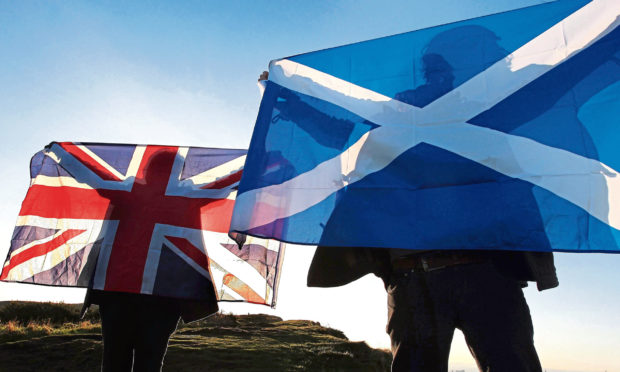Back in the dog days of 2014, with the independence referendum at its frantic height, I became embroiled in an online spat.
It had nothing to do with the substance of a post-UK Scotland’s economic policy or the likelihood of EU membership – it was about whether I’d used the correct pronoun.
I’d written an article in which I used the phrase “we Scots”. Was I some kind of idiot, queried my interlocutor. It was “us Scots”. How could anyone – including my children, he wondered – trust my views about anything if I couldn’t grasp simple matters of grammar?
I can’t remember now which of us/we was in the right regarding we/us, but since this is my column, let’s agree it was me. It was anyway one of many strange interludes, as the more excitable cybernats fashioned ever more innovative avenues to attack me and those like me who then favoured a “No” vote.
They went further, of course, even to the point of questioning my right to define myself as Scottish at all. The response to one article saw me denounced variously as a Nazi, a white supremacist, a cap-doffing lickspittle, a ridiculous cringing joke of a human being, Uncle Tom in a kilt, an utter moron, a bitter traitor, and a racist. I was told to **** off back to London. My children – the critics seemed particularly concerned about the state of my relationship with the mini-Deerins – should disown me.
I know there are some who look back at 2014 as a festival of democracy. In my experience, these people tend exclusively to have been on the “Yes” side of the debate. Those of us advocating for the other team had a less fun time of it, in part due to the aggressive swagger of Alex Salmond’s “Yes” campaign and his rage-filled online corps – remember Salmond unforgivably dividing Scots into “Team Scotland” and “Team UK”?
It’s also true that the Better Together arguments lacked poetry – they were grimly taut warnings of economic collapse and international isolation, hardly the kind of thing to engender the feelgood factor.
Perhaps this is why I look ahead to the likelihood of a second referendum with some dread. The traumas inflicted by both sides in 2014 have in many cases not healed. The rancour, bitterness and division have continued to simmer. It is unthinkable that doing it all again will have a different outcome, whatever the result. Wound, meet salt.
What will be different, of course, will be the weight of opinion. Next time – the only reason there will be a next time, in fact – the “Yes” side will start out ahead. It was only a decade ago that support for independence was stuck about the 30% mark. Today, polls show it sits comfortably above 50% – the most recent survey neatly reversed the 2014 result, putting “No” on 45% and “Yes” on 55%. By the time we come to vote that lead could be higher still, with the pro-Union side fighting a desperate, defensive – and perhaps losing – battle.
The result will matter and shape the nation for decades, if not centuries, to come. But the nature of the campaign will matter, too. Thankfully, Salmond is now a busted flush, a walking grudge with a Kremlin-funded TV show, and Nicola Sturgeon tries to exercise a steadying decency over her movement.
The “Yes” side seems likely to bring greater realism to the challenges an independent state would face. The “No” campaign will have to show more humility. The Brexit referendum proved that painting terrifying vistas of future disintegration and penury is not enough, especially when the current reality is none too pretty.
Is there any possibility that indyref 2 could be held in a mature climate, with the issues interrogated in a serious fashion by people of good faith on both sides, as a watching world shakes its head in respectful awe? Of course not. It will be bare-knuckle battle, with gouging and below-the-belt punching unhampered by the presence of a referee. The British state will not go down easily – and the independence movement will know this is its last chance for a (real, this time) generation.
The outlines are already coming into focus. Last week, Michael Gove, the Cabinet Office minister, suggested the franchise for a referendum could be extended to include the hundreds of thousands of Scots living elsewhere in the UK who were not allowed to vote in 2014. The calculation, clearly, is that these “British” Scots could swing the result in favour of the Union.
Meanwhile, Nicola Sturgeon described as “wise advice” a tweet from an independence supporter warning, in the wake of the recent polls, that “Yes” supporters should be “open, empathetic and engaged” with pro-British Scots. “We have a responsibility to reduce divisions based on identity,” it said.
So, here we go again. The debate over what constitutes our national identity has restarted. The dirty tricks are being conjured by cackling strategists. Demands that we play nice are being issued by politicians who, in the heat of the moment, are themselves unlikely to resist terrible naughtiness.
Wouldn’t it be something if, in the next few years, we could set an example of dignified democratic integrity to the rest of our ailing planet? Sadly, we/us Scots are more likely heading towards one almighty, splintering collision.
Chris Deerin is a leading journalist and commentator who heads independent, non-party thinktank Reform Scotland

